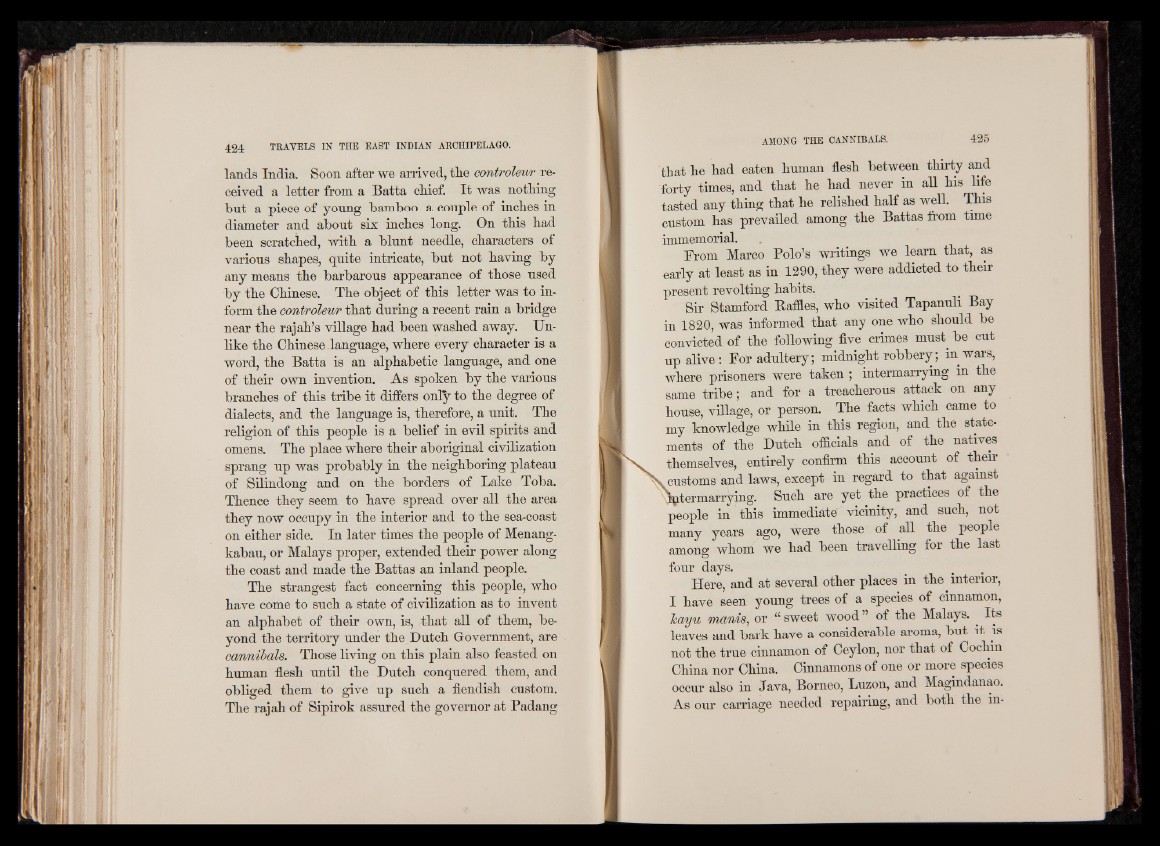
lands India. Soon after we arrived, the contrôleur received
a letter from a Batta chief. It was nothing
but a piece of young bamboo a couple of inches in
diameter and about six inches long. On this bad
been scratched, with a blunt needle, characters of
various shapes, quite intricate, but not having by
any means the barbarous appearance of those used
by the Chinese. The object of this letter was to inform
the contrôleur that during a recent rain a bridge
near the rajah’s village had been washed away. Unlike
the Chinese language, where every character is a
word, the Batta is an alphabetic language, and one
of their own invention. As spoken by the various
branches of this tribe it differs only to the degree of
dialects, and the language is, therefore, a unit. The
religion of this people is a belief in evil spirits and
omens. The place where their aboriginal civilization
sprang up was probably in the neighboring plateau
of Silindong and on the borders of Lake Toba.
Thence they seem to have spread over all the area
they now occupy in the interior and to the sea-coast
on either side. In later times the people of Menang-
kabau, or Malays proper, extended their power along
the coast and made the Battas an inland people.
The strangest fact concerning this people, who
have come to such a state of civilization as to invent
an alphabet of their own, is, that all of them, beyond
the territory under the Dutch Government, are
ca/rmibals. Those living on this plain also feasted on
human flesh until the Dutch conquered them, and
obliged them to give up such a fiendish custom.
The rajah of Sipirok assured the governor at Padang
that he had eaten human flesh between thirty and
forty times, and that he had never in all his life
tasted any thing that he relished half as well. This
custom has prevailed among the Battas from time
immemorial.
From Marco Polo’s writings we learn that, as
early at least as in 1290, they were addicted to their
present revolting habits.
Sir Stamford Raffles, who visited Tapanuli Bay
in 1820, was informed that any one who should be
convicted of the following five crimes must be cut
up alive : For adultery; midnight robbery; in wars,
where prisoners were taken ; intermarrying in the
same tribe; and for a treacherous attack on any
house, village, or person. The facts which came to
my knowledge while in this region, and the state- aments of the Dutch officials and of the natives
| \ themselves, entirely confirm this account of their
customs and laws, except in regard to that against
Intermarrying. Such are yet the practices of the
people in this immediate vicinity, and such, not
many years ago, were those of all the people
among whom we had been travelling for the last
four days. . . .
Here, and at several other places in the interior,
I have seen young trees of a species of cinnamon,
Jcayu manis, or “ sweet wood” of the Malays. ' Its
H leaves and bark have a considerable aroma, but it is
not the true cinnamon of Ceylon, nor that of Cochin
China nor China. Cinnamons of one or more species
occur also in Java, Borneo, Luzon, and Magindanao.
As our carriage needed repairing, and both the in